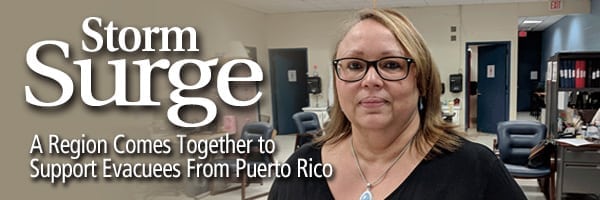
A Region Comes Together to Support Evacuees from Puerto Rico
Storm Surge
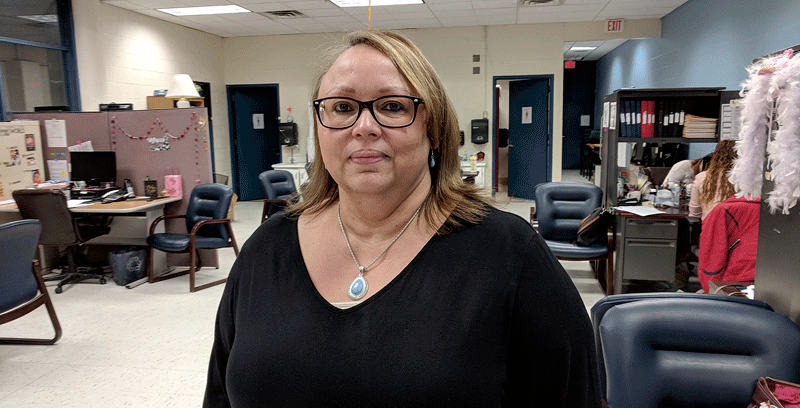
Rosa Espinosa, director of Family Services at the New North Citizens Council
What happens when a family arrives in the Springfield area from far away, with no job, transportation, or living arrangements? What happens when hundreds come? That was the challenge — and certainly still is — wrought by Hurricane Maria, which devastated the island of Puerto Rico last fall and sent a flood of evacuees to the Western Mass. region. Efforts to help them find relief have been inspiring, but the needs remain great, and the path ahead far from clear.
When Holyoke High School opened its Newcomer Academy in August — a program that helps non-English speakers access classes taught in Spanish while getting up to speed on English — administrators had no idea just how timely the launch would be.
“Holyoke, for many years, has looked for alternative types of bilingual-education models, and even before the hurricane, we were seeing a lot of newcomers who needed time to build up their English-language skills,” said Ileana Cintrón, chief of Family and Community Engagement for Holyoke Public Schools.
‘The hurricane,’ of course, is Hurricane Maria, which devastated the island of Puerto Rico in September, prompting a mass exodus of displaced families seeking relief on the U.S. mainland. Western Mass. was a natural landing spot, with Puerto Rican cultural roots running deep in Greater Springfield; Holyoke, is, in fact, home to the largest percentage of Puerto Rican residents of any city outside the island itself.
That’s why 226 students whose families evacuated Puerto Rico in the wake of the hurricane enrolled in Holyoke schools shortly afterward; nearly 200 are still attending, with many families contemplating a permanent relocation to the Pioneer Valley. In Springfield, the number is close to 600.
“It was difficult at the height of it, but in the last few weeks it’s really dwindled down,” Cintrón said, noting that the school district was fortunate that HHS saw the most enrollees of the city’s 11 schools.
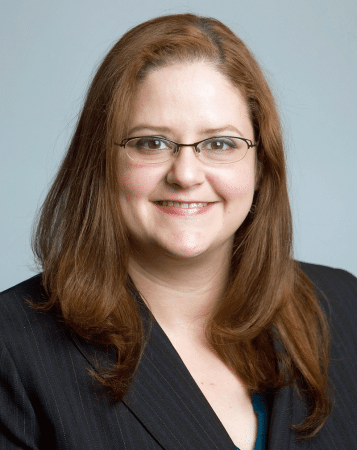
Iileana CintrÓn
“It was beneficial to us that Holyoke High School had opened the Newcomer Academy in late August and is able to provide students coming to the high school with Spanish-speaking support and access to content in Spanish,” she said. “It gives them hope they won’t lose a year. That’s what happened before — try to learn English and see where you’re at by the end of the year. Now they can keep up with math and science while still learning English, where before, it meant lost time and a lot of frustration.”
‘Frustration’ is an understatement when it comes to the needs of hundreds of families that have flocked to Greater Springfield since October, seeking housing, jobs, education, and, in many cases, the basic necessities of life that they suddenly could not access when Maria knocked out power, infrastructure, and key services throughout Puerto Rico.
“Many came with the bare minimum,” said Wilfredo Rivera, a volunteer with Springfield-based New North Citizens Council, one of the regional organizations busy receiving evacuees and connecting them with resources to find temporary relief in Western Mass. or, in some cases, start a new life.
He noted one family with a newborn who had medical records and discharge papers from the hospital, but were unable to procure a birth certificate — which is typically needed to access benefits here — before fleeing. “That’s just one example of what happens when people leave the island but don’t have time to gather their documents, or they don’t know what they’ll need here.”
New North Citizens Council meets advocacy and human-services needs on a daily basis, said Rosa Espinosa, director of Family Services, but its role — along with Enlaces de Familia in Holyoke — as one of two major ‘welcome centers’ for people displaced by the hurricane has been a challenge, albeit a gratifying one.
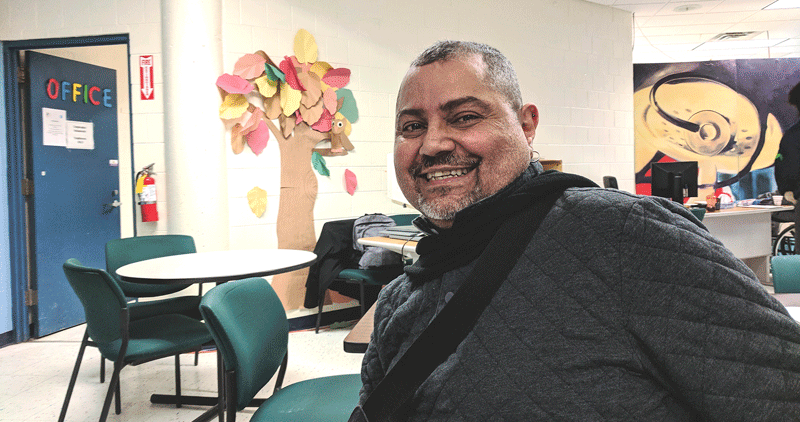
Wilfredo Rivera says each displaced family has its own story and unique set of needs.
“We have our regular clients who come in every day,” she told BusinessWest, “but when the hurricane happened, that was an outrageous number of people coming in. But we were pretty resourceful, and some of the evacuees themselves were pretty resourceful; we learned from them as they learned from us.”
Rivera ticked off some of the more challenging cases, such as children and adults who fled with oxygen supplies, dialysis machines, or chemotherapy needs, and others who landed in an area hotel or motel — paid for by FEMA, but only for a limited time — without much money and no transportation, family in the area, or job prospects.
“The majority of services they needed were services we already provided — SNAP, MassHousing, employment resources, access to computers — so those things were in place,” he said, “but we were suddenly doing it on a much larger scale.”
The way they and others have done so — aided by a flood of donations to area organizations providing some of those resources and attention from local businesses looking to hire evacuees — has been a regional success story of sorts, but the work is far from over.
A Call Goes Out
Jim Ayres, president and CEO of the United Way of Pioneer Valley, said his organization was meeting very early on an evacuee-assistance strategy. Early on, Springfield and Holyoke designated the welcome centers as places to go to find out how to enroll a child in school, meet nutrititional needs, and get immediate health services. “Then there’s the underlying trauma piece and mental-health needs people may have. It takes a lot of coordination, a lot of logistical management.”
Rivera noted that every individual or family that comes to New North is handled on a case-by-case basis. “We don’t group people into categories. Every individual is assessed individually based on what their needs are.”
For example, “there’s a large group of people here for medical reasons — dialysis, cancer treatments, the types of things that require electricity,” he explained. “A lot of families did not want their kids to lose out on education, and that’s why they chose to come. Others lost their jobs. The majority who came have family here or know someone in the area; others were born here but grew up on the island, so they had some connection.”
Many are looking to stay for the long term, if not permanently, he added. That’s especially true of the families with children enrolled in school or those who needed critical medical services and prefer the treatment they’re getting in Western Mass. over what’s available right now on the island. “Those are the two biggest factors keeping people here. And a lot of them are employed already; they’re working and want to keep their jobs.”
Recognizing that critical needs exist both in Western Mass. and back in Puerto Rico, the Western Massachusetts United for Puerto Rico coalition, which came together shortly after the hurricane struck, has collected $180,000, with $80,000 going to the Springfield and Holyoke welcome centers, and $100,000 being divided equally between 10 organizations that do relief work directly on the island.
“My sense is a lot of them want to go back to their own homes,” Ayres said of the displaced families. “Whether that means six months, one year, five years, no one really knows at this point.
“This is in some ways more of a Western Mass. challenge than statewide. The state has been receptive as a whole, but it’s hitting Hampden County more than anywhere else,” he added, noting that the situation poses some unexpected budgetary dilemmas, particularly in the school systems. “The state compensation method is driven by your enrollment in October 1, which was just a few days before people started coming, so they’ve asked the state to look at the formula in a different way.”
Indeed, the Holyoke school system has hired more teachers and paraprofessionals to handle the surge, including five from Puerto Rico.
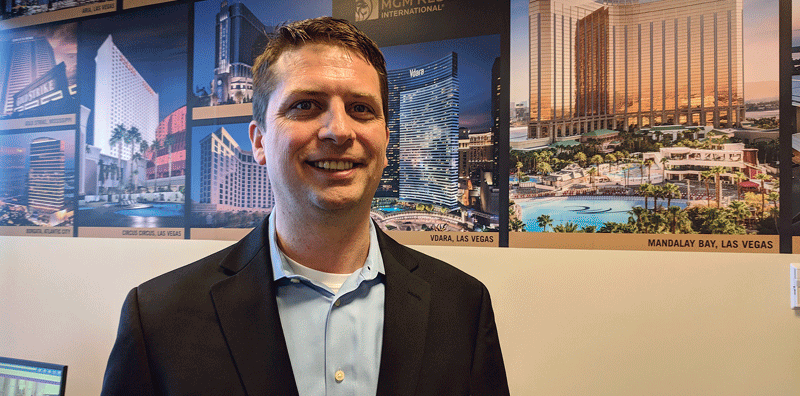
Jason Randall says many evacuees already have the skill sets MGM Springfield is looking for.
One challenge has been the arrival of families without school records in hand — a particular challenge for students with special-education needs, Cintrón said. Another is the requirement that seniors must have passed the MCAS exam to graduate, when the 10 seniors at HHS who transferred in because of the hurricane might been studying a much different curriculum on the island.
“The district is waiting for guidelines from the state about that,” she said, noting that one of those students was already accepted to Harvard while living in Puerto Rico — but will now need to pass the MCAS before enrolling there.
Another challenge is the emotional stress the new students are dealing with — Cintrón said it can take two years, in some cases, for such trauma to manifest outwardly — yet, she suggested school may actually be a bright spot in their lives.
“The major sources of stress deal with the lack of housing and the feeling of impermanence — stay at a hotel for a week, then stay with a grandmother for two weeks in public housing, but then find you can’t stay longer than that, and not always eating three meals a day. School may provide some sense of stability and normalcy — or, at least, we try.”
She was quick to note that the district took in 75 students from Puerto Rico last summer because of non-hurricane factors like economic hardship on the island, “so we’re used to getting those students. It was just more in the fall.”
Some students are also eligible for a dual-language program at the elementary level, said Judy Taylor, director of Communications for Holyoke Public Schools. “When students arrive at school, they’re given a language assessment test, and based on the results of that test, they’re given the supports they need.”
Living Wage
For most families, however, no support is more important than job-finding resources.
With that in mind, New North Citizens Council arranged a meeting in January with human-resources leaders at MGM Springfield, which is in the unique position, among area companies, of currently staffing up a 3,000-employee operation. Attendees were given an introductory presentation (in Spanish) detailing the company’s needs, followed by skills assessments and meetings with HR staff.
“We want to share our message about career opportunities, because 3,000 positions is a lot of roles to fill,” said Jason Randall, director of Talent Acquisition and Development. “So when New North came to us about these displaced families from Puerto Rico due to the hurricane, we wanted to share the opportunities that we have. Puerto Rico has a large hospitality industry, with casinos and resort properties, and a lot of individuals from the area who were displaced have the skill set and the commitment to service that we’re looking to provide here.”
The company is hiring for roles ranging from culinary services to hotel operations to gaming operations, and many evacuees have those skills, or the ability to learn them quickly, Randall added.
“Basic English is a requirement for all our positions — you have to be able to communicate in the event of an emergency — but certainly, through our partners, English as a second language courses are offered to prepare people for that.”
It can be tough to find a job without a car, and nigh impossible to afford a car with no income, but some evacuees are arriving with neither — and often no place to stay. Espinosa said getting them set up with housing and job prospects can be a challenging, step-by-step process, one beset with roadblocks that have the welcome-center staff thinking on their feet.
One client, for example, walked from the South End to the New North Citizens Council — more than two miles — with her children to access resources. But she needed to come back the following day, so the staff dipped in their pockets to buy her bus fare in both directions. The next day, Espinosa reached out to the Pioneer Valley Transit Authority for more passes to give to other families, and the PVTA was happy to donate them.
Employers have heard of the needs, too. Pride Stores had four openings at its West Street location in Springfield. “We were told, ‘I don’t need them to speak English; I just need them to bake,’” Rivera recalled. Other companies, from J. Polep Distribution Services and CNS Wholesale Grocers to businesses needing barbers, mechanics, and caregivers, have reached out with information about openings.
Companies have contributed to the relief cause in other ways as well, such as the 7-Eleven that recently opened at Wilbraham and Parker streets, far from the North End of Springfield, but decided nonetheless to donate raffle proceeds from its grand-opening event to the welcome center. Meanwhile, organizations like the Massachusetts Law Reform Institute are providing free legal services.
In addition, “there’s a huge group of volunteers helping to feed these families dinners,” Cintrón said. “Some are staying in hotels with no access to a fridge or microwave, so there’s a whole network of volunteers, restaurants, and soup kitchens delivering meals to the hotels.”
Espinosa is grateful for all of it. “Throughout this journey, we have met a lot of caring individuals, and it’s refreshing to hear from someone, ‘hey, I heard about the welcome center, and I want to do this for you.’ It’s a good feeling.”
And the clients who need help are grateful in return, she added. “They’re not a number to us; they’re a family in need, with medical needs, or with children with medical needs. And we’ll go the extra step; if we have to pick up furniture and bring it to a family over the weekend, we’ll do that.”
Looking Up
Rivera is clearly passionate about making a difference, in whatever way he and the other volunteers and staff can. “It’s good to know you were one tiny part of getting somebody stable.”
Espinosa takes it all in stride, understanding that New North’s work didn’t dramatically change with the influx of hurricane evacuees — it just got a little (OK, a lot) more hectic. But she knows her team is making a real impact on the lives of Puerto Rico’s evacuees.
“One told me, ‘there is God, and there are angels, and then there are you guys,’” she recalled.
Rivera simply smiled. “I’m good with that,” he said.
Joseph Bednar can be reached at [email protected]




